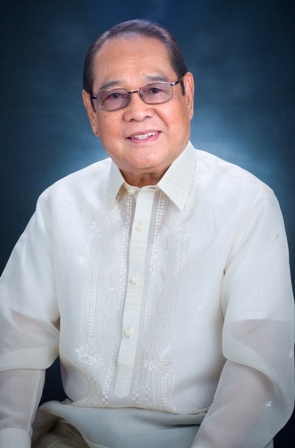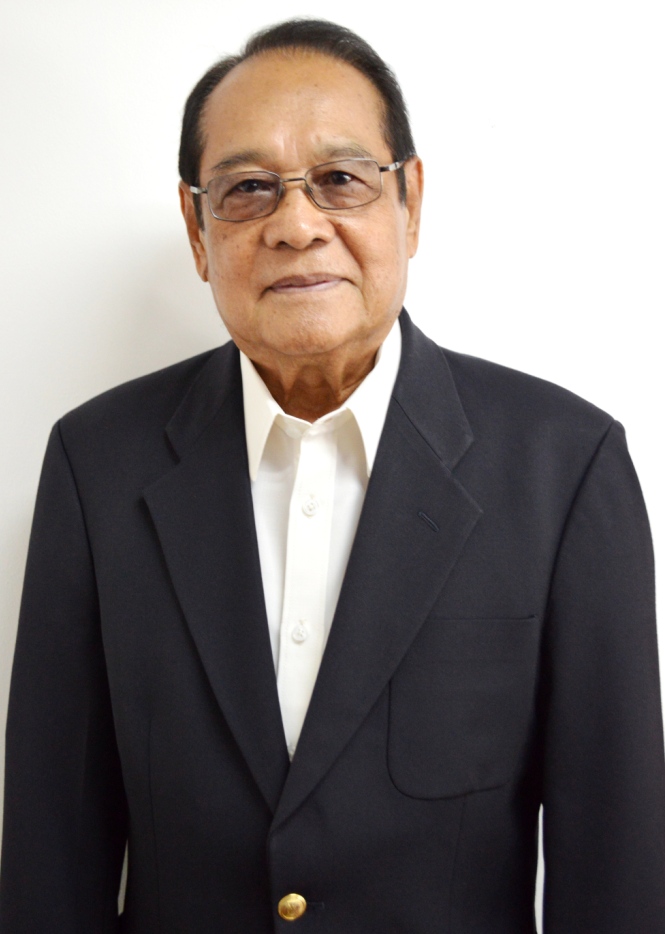
 ARTEMIO G. TUQUERO was born in Victoria, Tarlac, 81 years ago. He was the youngest of seven (7) children born to the spouses Antonino R. Tuquero and Benigna V. Gelacio, both deceased.
ARTEMIO G. TUQUERO was born in Victoria, Tarlac, 81 years ago. He was the youngest of seven (7) children born to the spouses Antonino R. Tuquero and Benigna V. Gelacio, both deceased.
He finished his primary education at the Victoria Elementary School where he was accelerated from Grade 5 to Grade 6, and his secondary education at the Victoria High School, graduating as valedictorian of his class.
An entrance scholar at the Manuel L. Quezon Educational Institution (now Manuel L. Quezon University), he was able to enjoy full scholarship while pursuing his pre-law course and law degree. He merited membership in the Knights of the Golden Fleece (Kappa Gamma Phi), an exclusive fraternity of University scholars. For obtaining the highest average from first to third year in the School of Law, he was awarded the MLQU Scholarship Medal in 1955. A year later, he obtained his Bachelor of Laws degree, magna cum laude. He passed the 1956 Bar examinations with a rating of 85.45%.
Although his experience in the public service started with his appointment as Special Attorney in the Commission on Elections during the 1957, 1959, and 1961 elections, he looks back with a certain degree of pride and honor to his experience at the Court of Appeals, where he worked with then Presiding Justice Jose P. Bengzon and Associate Justice Carmelino G. Alvendia as Private Secretary and Attorney-Researcher, respectively. He regards the two with high esteem and considers them respected mentors. Years later, he proved his mettle in his less than four years in the Court of Appeals as Associate Justice when he was consistently in the top five in monthly case disposal, topping the list fifteen times and leaving only about fifty (50) unresolved cases when he left the Judiciary to be at the helm of the Department of Justice as its Cabinet Secretary.
In the prosecution arm of the government, he first served as Assistant Fiscal in the City of Manila, and it was during this time when he was designated as Special Assistant to Justice Minister Ricardo C. Puno and was beckoned at the Department of Justice in Padre Faura. Later, upon recommendation of Minister Puno, he was appointed by President Ferdinand E. Marcos as Chief State Prosecutor of the National Prosecution Service (NAPROS), Department of Justice. He subsequently served as Undersecretary of Justice in charge of NAPROS Luzon and Metro Manila. During his tenure as Chief State Prosecutor, he contributed significantly towards the reorganization of the NAPROS, worked for the upgrading of the salaries of prosecutors to be at par with their counterparts in the Judiciary, and for the grant of their representation and travelling allowances (RATA). He continued his incessant vigil of the prosecution service upon his appointment as Secretary of Justice when he vigorously pushed for the speedy and judicious resolution of appealed cases by setting the example himself, and through the issuance of the 2000 NPS Rule of Appeals, which simplified the procedure governing appeals to the Secretary of Justice, thus expediting their disposition.
During his stewardships of the Department of Justice, under which is the administrative supervision and control of the Bureau of Corrections (BUCOR), he revised and updated the BUCOR Manual for the Board of Pardons and Parole in light of the controversial Manero pardon.
His one glaring passion is the academe. To him, knowledge and expertise are of no value unless they are shared and properly disseminated. Next to home and family, he considers the school as the next best place to discover new horizons. He exemplified this when he became Dean of the UE College of Law and the MLQU School of Law. In both, he introduced innovations, and reforms, and revised the law curriculum to make it Bar-oriented, thus increasing the chances of law graduates to become members of the law profession. He also worked for the upgrading of the salaries of law professors to a level commensurate to the prestige and dignity of the profession. It is highly noteworthy that he successfully worked for the opening of the College of Law in the Universidad de Manila during his incumbency as its President.
His marriage to Teresita S. Cabasada, then a Nutrition student at the Philippine Women's University, was blessed with five children: Arelene, Terelyn, Juan Antonio, Artemio, Jr., and James Arnold.
Arlene, who holds a degree in Economics, cum laude, from the University of the Philippines and a masteral degree in Computer Science from the PAC University, New York City (NYC), is now Applications Service Manager, Vice President, Bank of New York Mellon, NYC.
Terelyn, migrated to the United States of America before she could finish her course in Fine Arts at the University of Santo Tomas. She now works at the Accounting Department, Brookhaven Memorial Hospital, Patchogue, Long Island, NYC.
Juan Antonio or "Jay" for short, is a Doctor of Medicine who wants to be a "medico-legal", thus in pursuit of a dream to become a member of the BAR after fulfilling the academic requirements of a Bachelor of Laws - his second college course. He is presently connected with the Office of Associate Justice Japar Dimaampao in the Court of Appeals.
Artemio, Jr., with a degree in Computer Science from the Ateneo de Manila University, is now Senior Developer, J.P. Morgan Chase, NYC.
James Arnold, finished a course in Marketing and was also recipient of a certificate of completion from the Center for Culinary Arts, Quezon City.
Intellectual, compassionate, and morally upright, Tuquero was a recipient of the 2007 Most Outstanding MLQU Alumnus Award, "in recognition of his impressive academic performance that enabled him to go through all levels of his education via scholarships, his readiness to share his legal expertise with those who seek redress for their grievances, and most especially, his strict adherence to the moral doctrines of his Church that makes him impervious to the temptations attendant to a high office in the government service."
Official CEP Media announcements:
» » »

